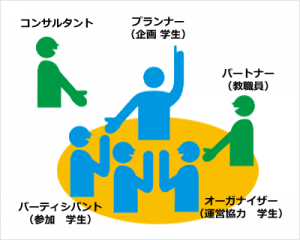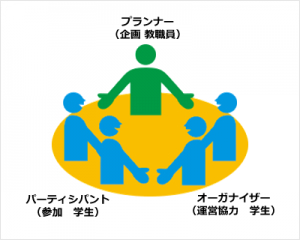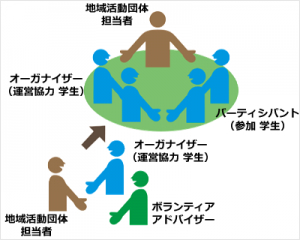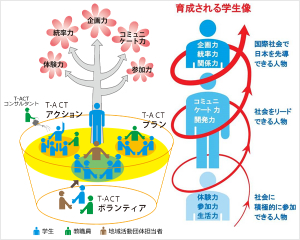T-ACT is short for Tsukuba Action Project, which was launched to help students start and run their own projects.
Get involved with an existing project run by like-minded students!
Launch and lead your own project!
Propose your idea and get started!

Three kinds of T-ACT
(1) T-ACT Action
These are student-led activities.
Launch your own project from scratch and gather like-minded students.
(2) T-ACT Plan
These are activities conducted in collaboration with faculty and staff members.
Communicating with faculty and staff members provides opportunities to learn about their expertise and management skills.
(3) T-ACT Volunteer
These are volunteer activities organized by community action groups.
Take the first step and become involved in activities that contribute to society.
T-ACT activities are characterized by their relatively short term. (Actions and plans finish in less than six months.)
You can start an activity when the timing suits you!
You are free to choose the content, scale, and location of your plan. You will not be forced to continue.
Give it a go and take action!
Characteristics of each T-ACT
学生の立案による活動

T-ACT Action
These are student-led activities in which students launch projects that are in line with their own interests and for which there is a need from scratch, and get like-minded students involved.
You are free to choose the content, scale, and location of your plan as long as the activity is a one-off, short-term plan of less than six months and does not violate the law or school regulations.
It is fine even if you only have a vague concept!
T-ACT will provide support to launch the project.
教職員の立案による活動

T-ACT Plan
These activities originate from the social awareness and expertise of faculty and staff members and are opportunities for students to communicate and collaborate with faculty and staff members.
Faculty and staff members provide a model for launching plans by making the most of their expertise and planning and managing colleagues, and this will hopefully lead to the launch of T-ACT Actions.
地域活動団体のボランティア活動への自発的参加活動

T-ACT Volunteer
You can participate in volunteer activities organized by community action groups. It is also possible to launch new activities together with community action groups.
You will be able to identify a variety of issues in the society (local, national, and global) and find ideas, academic skills, and knowledge to solve these issues.
Self-motivation, planning ability, and social skills nurtured through T-ACT activities
Through the activities, T-ACT aims to develop social skills in five areas, namely participation, experience, communication, leadership, and planning capabilities.
Specifically, the ability to actively participate in activities, the ability to experience a variety of activities, the ability to communicate and work cooperatively with others, the ability to lead others to achieve a goal, and the ability to plan to create something new.
Participating in T-Act activities will help students develop diverse skills and acquire capabilities that are needed in modern society.
The activities of each and every student will not only energize the University of Tsukuba, but also create a bright future for each of you.

Origins of T-ACT
The Tsukuba Action Project was conceived by a preparatory team of faculty and staff members (Team T-ACT), and launched after it was selected by MEXT as a Student Support Program to Meet Emerging Social Needs (“Student Support GP”). The project received grants for four years from 2008 and the University also provided funding.
What is Student Support GP?
This is MEXT’s Student Support Program to Meet Emerging Social Needs called Student Support GP (Good Practice). This program was designed to enhance the student support function of universities by selecting outstanding projects that are expected to be particularly effective from among organized and comprehensive student support projects of each university, with the aim of enhancing students' personal abilities and encouraging them to become members of society with an interest in human welfare. The program provides information to society at large, and provides financial support for the projects.
In 2008, 23 programs (16 universities, 4 junior colleges, and 3 vocational schools) were selected from among 230 applicants.
The Student Support GP Program of the University of Tsukuba is “T-ACT.”
Name of the program when selected as a Student Support GP (2008 to 2011)
Student support through the formation of a collaborative community and creation of new volunteer activities that bring together students and faculty/staff members
Our Aim
This program is an innovative student support program that aims to achieve the holistic development of students by considering all students and faculty/staff members as human resources of the university and using their network as a foundation to encourage students to launch a large range of independent and diverse activities.
This framework as a whole is called the Tsukuba Action Project and it seeks to develop the independence and social skills of all students, including those with potential who feel a sense of inertia.
Through the accumulation of various fluid and dynamic activities by the collaborative community created by students and faculty/staff members, we aim to nurture human resources who will have the creativity and communication skills that the modern society needs.













![Contact Us[029-853-2269/2222]](/en/img/txt_contact01.jpg)
